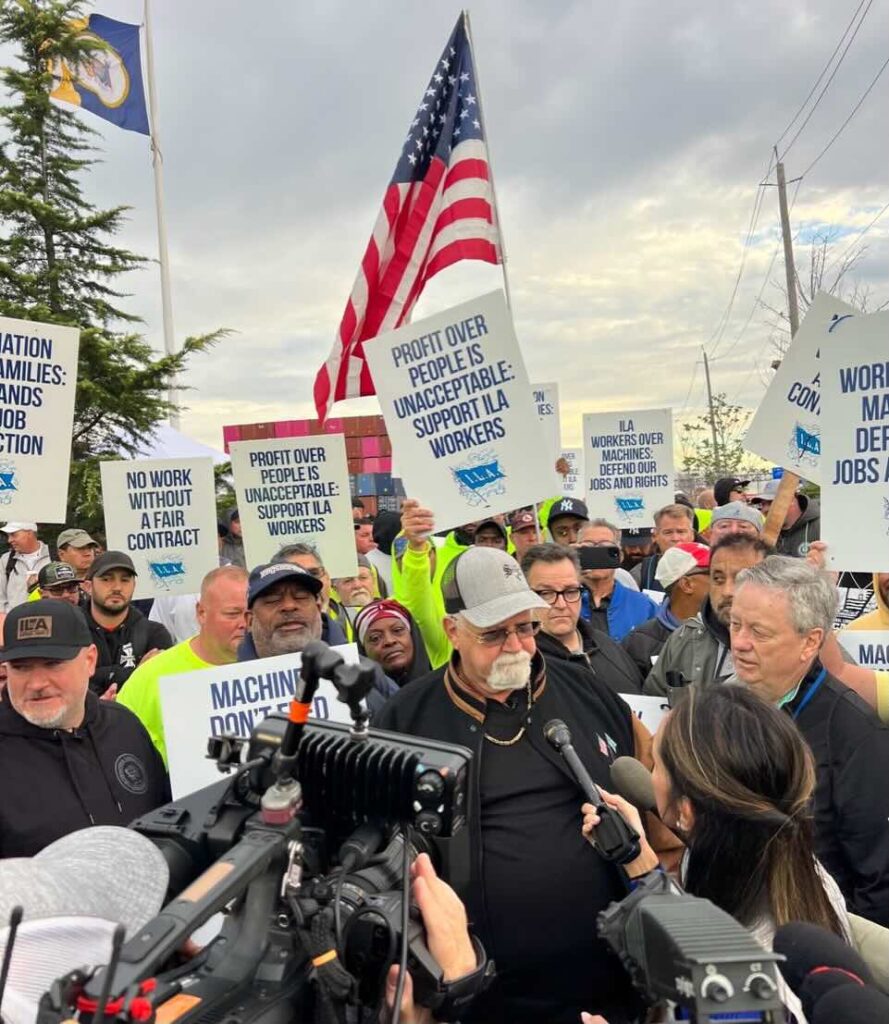This rebuttal stems from a Journal of Commerce article we recently shared on the official ILA Facebook page. In it, LucArnouts, Vice President of International Relations and Networks at the Port of Antwerp, recently made the outrageous claim that cutting a work gang from eight dockworkers to four is somehow a positive step. His reasoning? He says automation can handle the rest, and that the other four workers can “sit in the corner” getting paid to do nothing.
This is one of the most tone-deaf and dangerous arguments I’ve ever heard from someone in a leadership role at a global port. Arnouts doesn’t even pretend to hide behind the typical corporate excuse that automation is being introduced for “safety” or “efficiency.” No, he says the quiet part out loud: it’s about cutting labor. There it is folks, that’s their the agenda. Plain and simple.
They spin it in slick buzzwords like “competitiveness,” “modernization,” and “innovation,” hoping no one notices that they’re pushing people out the door. But let’s be honest: this isn’t about productivity. It’s about eliminating people from the payroll, and cutting labor costs while earning record profits.
And we’ve already disproved the productivity myth, especially when it comes to non-transshipment terminals. We’ve studied it. We’ve visited the ports. And we’ve seen it firsthand: fully automated terminals around the world move cargo at a snail’s pace compared to operations run by skilled longshore labor. Human controlled machinery outperforms automation every time when it comes to volume, adaptability, and consistency.
Arnouts claims, “If I need eight people on a gang to do a job, then I do some automation I can do the job with four.” He follows that with, “You still need to put the eight men there so four will be sitting here in the corner, earning their money but not doing anything.”
What a gross misunderstanding — or more likely, an intentional distortion, of how real port operations work. Those so-called idle workers? They’re the ones who keep terminals functioning when systems go down, when safety is on the line, and when cargo needs to move under urgent conditions. This industry is 24/7, unpredictable, and high-risk. Human oversight isn’t optional, it’s essential.
But perhaps the most disturbing part of Arnouts’ comments is the thinly veiled threat he makes to dockworkers. He says, “We feel that discussions (over automation) have become more mature with the unions understanding that keeping the eight people there will, in the end, lead to zero people working at that spot.”
Let me be crystal clear: that’s not maturity, that’s a threat. It’s corporate blackmail. It’s saying, “Give up half your jobs today or lose them all tomorrow.” And it exposes the true playbook behind automation: not advancement, but elimination. This isn’t progress, it’s regression disguised as innovation. And it’s working people who pay the price.
Arnouts also tries to justify all of this by saying there’s a labor shortage. Let me ask: what jobs are we talking about eliminating? These are good, union-protected, family-sustaining jobs. If there’s truly a shortage, the answer isn’t to cut workers, it’s to hire, train, and invest in people.
We’re already facing a global labor crisis. Artificial Intelligence is projected to eliminate up to 50% of all entry-level jobs, and unemployment is expected to hit 20% within the United States alone in two years. Removing stable jobs only deepens that crisis. And when those jobs disappear, so do the communities built around them, the schools, the diners, the local businesses, and the working-class families that hold society together.
Let me be crystal clear once again: this is not just a dockworker issue, this is a human issue. This wave of automation will hit every workforce if it hasn’t already, blue collar, white collar, will lead to no collar.
That’s why the ILA and dockworker unions from around the world will convene in Lisbon on November 5th for a global Anti-Automation Conference, organized by the International Dockworkers Council. This will be a unified call to action to confront the spread of job-killing automation and to protect the dignity of work.
Luc Arnouts may think job cuts are a necessary evolution. We believe they’re a death sentence for the working class. And frankly, he needs his head examined if he thinks workers will sit quietly while their livelihoods are dismantled in the name of “progress.”
We will not allow it.
We will fight back.
And we will win together!
Harold J. Daggett
International President
International Longshoremen’s Association

